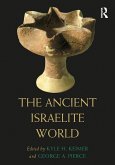Perhaps no biblical episode is more troubling than the conquest of Canaan. But do the so-called holy war texts of the Old Testament portray a divinely inspired genocide? John Walton and J. Harvey Walton take us on an archaeological dig, reframing our questions and excavating the layers of translation and interpretation that cloud our perception of these difficult texts.
Hinweis: Dieser Artikel kann nur an eine deutsche Lieferadresse ausgeliefert werden.
Hinweis: Dieser Artikel kann nur an eine deutsche Lieferadresse ausgeliefert werden.








